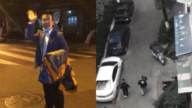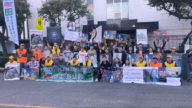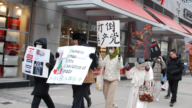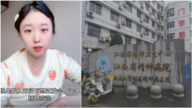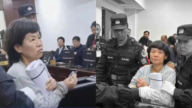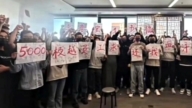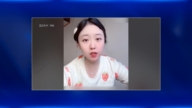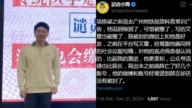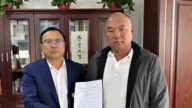【新唐人2013年10月26日訊】10月22號,總部位於美國華盛頓特區的非政府組織「自由之家」(Freedom House),發表了一項研究報告,其中透露,中共近幾年來,逐漸將箝制新聞自由的手段延伸到了海外。下面請跟本臺記者一起去了解。
這份為國際媒體援助中心(Center for International Media Assistance)撰寫的報告中,身為作者的「自由之家」分析師薩拉•庫克(Sarah Cook),追蹤了中共對中國海內外西方媒體、和中文媒體,以及東南亞、非洲和拉美其他媒體的影響後,得出了中共逐漸將它令人擔憂的新聞出版審查制度伸展到了海外。
國際記者聯合會香港和中國區代表胡麗云:「我們也看見,有這個報告發出來,也是覺得挺擔心。中共官方的任何人,每一次對媒體要寫報導的時候,他們就挺關注的,這已經是他們的一個習慣了。中共一直的做法就是在還沒有去報導之前,就盡量去影響媒體。」
自由之家的報告中,將中共向海外媒體的施壓分為4種方式,包括中共官員直接懲罰拒不聽從中共對媒體報導限制的海外媒體﹔或通過利誘,引導媒體自我審查﹔以及通過外國政府或廣告商等代理人,間接施壓﹔最後是採取網路攻擊和人身攻擊(但報告表明,無法追蹤證實中共當局有這類行為)。
庫克說,中共會依據不同的媒體類型,採取不同的攻擊手段。
對於大型國際媒體,中共會採用網路攻擊,或向廣告商、衛星公司間接施壓,以削弱它們在中國境內報導的能力。例如,美國《華爾街日報》和《紐約時報》證實,曾遭到中國黑客的攻擊。而且《紐約時報》的多名記者的簽證被中共當局延遲。
對於海外非政府組織的獨立媒體《新唐人電視臺》、和《大紀元》新聞網,也頻頻發生中共利用黑客攻擊網站的事件。
2005年,中共當局試圖迫使「歐洲通訊衛星公司」,終止與《新唐人》剛簽訂的租用W5衛星,向中國大陸及亞洲廣播的協定,但是未能成功。
胡麗云:「最極具影響媒體的就是廣告商,透過他們去施壓,而影響媒體的內容,或者是採訪的方向,(是)他們現在去做的這一個手段,其實也是過去在中共境內華人社區裏面,已經習慣用這個方法。」
早在2009年,《大紀元》旗下的《新紀元週刊》,曾報導美國獨立非盈利機構「詹姆斯通基金會(Jamestown Foundation)」在2001年11月21號發表的一篇文章,其中指出,美國的《世界日報》、《星島日報》、《明報》和《僑報》,都受著中國大陸直接或間接的控制。
庫克在報告中說,在南亞和東南亞等中共能大幅施展經濟手腕的地方,經常利用政府官員逼迫當地報紙,對中共進行正面報導。報告舉例說,有兩名越南人因藉由《希望之聲國際廣播電臺》的短波向中國廣播節目,而於2010年被捕。
而在台灣和香港等地,中共則是不斷加強輿論控制。已故的香港支聯會主席司徒華曾表示,《鳳凰衛視》不只是受中共資助控制,而且裏面的主要負責人都有國安背景。
胡麗云:「中國對香港媒體的影響都是一直在發生,越來越厲害 他們都是用不同的方式,去籠絡一些香港媒體的管理層。比如說,最近,他們又去邀請香港行政管理層全體,到國內去旅遊。真的是透過一個遠的方向去影響他們,」
自由之家的報告鼓勵全球所有媒體,公開它們所面臨的中共壓力,同時,公開批評那些沒有盡力對在華工作記者提供保護的政府。
採訪/易如 編輯/田淨 後製/蕭宇
Chinese Regime’s Censorship Extends Overseas
On Oct.22, Freedom House, a non-profit organization
headquartered in Washington, DC, published a study report.
It revealed that the Chinese Communist Party (CCP) has
gradually extended its suppression of freedom overseas.
Let’s follow our NTD reporter and learn a little more.
In this report from the Center for International Media
Assistance, author Sarah Cook tracked the effect of the CCP
towards Western media and overseas Chinese media,
including media in Southeast Asia, Africa, and Latin America.
She concluded that the CCP had extended
its news censorship overseas.
Hu Liyun, representative of the International Correspondents
Association of Hong Kong and China: “We have seen
this report, which is quite worrisome.
All Chinese officials are concerned about media reports.
The CCP has practiced this routine for some time and now
it has become a habit.
They focus on media reports and try to influence the media
before they publish them.”
In the Freedom House report, the CCP puts pressure from
four different directions on overseas media.
The CCP directly punishes overseas media for refusing
to follow its restrictions.
The CCP guides the media to self-censorship through
inducements.
The CCP indirectly puts pressure through foreign
governments or advertising agents.
And finally, the CCP may apply cyber attacks or physical
attacks (but the report indicated that it was unable
to track the Chinese authorities for such behaviors.)
Cook said that the CCP takes a different approach
with different media.
For large international media, the CCP will use cyber attacks
to diminish their abilities to report in China.
For example, the Wall Street Journal and the New York
Times both confirmed that they had been subjected
to Chinese hackers.
In addition, many reporters from the New York Times
ran into visa delay issues with Chinese authorities.
The CCP’s hackers often attacked overseas independent
media, such as NTD Television and the Epoch Times.
In 2005, the CCP tried to force Eutelsat to terminate
its contract with NTD Television for a lease of W5 satellite
to broadcast to Mainland China and Asia, but failed.
Hu Liyun: “For media, advertisers are most influential.
The CCP likes to use advertisers to impact media content
or the direction of interviews.
They are doing this, for they have grown accustomed to using
this method.”
As early as 2009, the Epoch Times’ New Era Weekly
reported that Jamestown Foundation, an independent
non-profit organization, published an article in 2001
which stated that many US newspapers such as World News,
Sing Dao Daily, Ming Bao and Qiao Bao were directly
or indirectly controlled by the CCP.
Cook said in the report that the CCP can use substantial
economic means to entice local officials to force
local newspapers to report positively on the CCP.
For example, two Vietnamese were arrested in 2010
for broadcasting to China by Sound of Hope Radio.
In Taiwan and Hong Kong, the CCP continues to strengthen
its control of public opinion.
Szeto, the late chairman of the Hong Kong alliance,
said that not only is Phoenix Satellite funded and controlled
by the CCP, but also all personnel in charge have a national
security background.
Hu Liyun: “China’s impact on Hong Kong has been
continuous and more and more powerful.
They use different means to win over Hong King’s media
management.
For instance, recently, they invited all Hong Kong
management to tour Mainland China.
This affects people really far and deep.”
The Freedom House report encourages reporters world-wide
to publicly reveal the pressure they face from the CCP.
Meanwhile, it also publicly criticized those governments
which do not try to protect their reporters who work in China.


